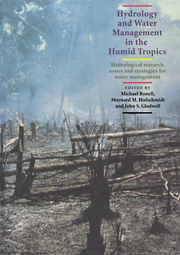 Hydrology and Water Management in the Humid Tropics
Hydrology and Water Management in the Humid Tropics Book contents
- Frontmatter
- Contents
- List of Authors
- Foreword by Federico Mayor, Director-General, UNESCO
- Preface
- Cartographic Credit
- Acknowledgements
- SECTION I INTRODUCTION
- SECTION II HUMID TROPICS SETTING
- SECTION III REGIONAL HYDROLOGY
- SECTION IV PHYSICAL PROCESSES
- 11 Recent Scientific Developments and Research Needs in Hydrological Processes of the Humid Tropics
- 12 Groundwater Systems in the Humid Tropics
- 13 Perspectives on the Hydrology and Water Resource Management of Natural Freshwater Wetlands and Lakes in the Humid Tropics
- 14 Erosion and Sedimentation
- 15 Water Quality Issues in the Humid Tropics
- 16 Ecological Characteristics of Tropical Fresh Waters: An Outline
- SECTION V PHYSICAL PROCESSES – HUMAN USES: THE INTERFACE
- SECTION VI MANAGEMENT ISSUES
- SECTION VII APPENDICES
- Place index
14 - Erosion and Sedimentation
Published online by Cambridge University Press: 23 December 2009
- Frontmatter
- Contents
- List of Authors
- Foreword by Federico Mayor, Director-General, UNESCO
- Preface
- Cartographic Credit
- Acknowledgements
- SECTION I INTRODUCTION
- SECTION II HUMID TROPICS SETTING
- SECTION III REGIONAL HYDROLOGY
- SECTION IV PHYSICAL PROCESSES
- 11 Recent Scientific Developments and Research Needs in Hydrological Processes of the Humid Tropics
- 12 Groundwater Systems in the Humid Tropics
- 13 Perspectives on the Hydrology and Water Resource Management of Natural Freshwater Wetlands and Lakes in the Humid Tropics
- 14 Erosion and Sedimentation
- 15 Water Quality Issues in the Humid Tropics
- 16 Ecological Characteristics of Tropical Fresh Waters: An Outline
- SECTION V PHYSICAL PROCESSES – HUMAN USES: THE INTERFACE
- SECTION VI MANAGEMENT ISSUES
- SECTION VII APPENDICES
- Place index
Summary
ABSTRACT
This chapter outlines some of the issues involved in erosion and sedimentation and the major approaches adopted by research investigators in dealing with them. Particular emphasis is given to recent developments in quantitatively describing soil erosion and deposition processes, and to elucidating the consequences of such description in the form of comprehensive mathematical models. How such models are used in practice to assess soil erodibility and depositability is illustrated, using data collected at the scale of runoff plots.
Approaches to investigating and representing erosion and deposition at the scale of catchments are also reviewed, although somewhat more briefly.
INTRODUCTION
Scientific study of soil erosion by water has a long history in the geographic and geomorphic sciences, where much of the emphasis is on erosion as one of the natural landscape-forming processes. Human activity, and especially the widespread and expanding activities of agriculture, has led to an acceleration of soil erosion commonly associated with agricultural practices. It is not surprising, therefore, to find that early agriculturally- focused research on soil erosion depended on successful agronomic research methodologies. These methodologies were typified by planned experimentation followed by quantitative (often statistically guided) analysis of the results obtained.
Following a significant period in which this fruitful agronomic type of approach has proved useful, research personnel now appear to be commonly using alternative methodologies in which more call is being made on physical theory to provide a framework in which experimental data are analysed. In this approach, parameters, which still have to be experimentally determined, are sought which are more closely related to the processes believed to be importantly involved in erosion and deposition.
- Type
- Chapter
- Information
- Hydrology and Water Management in the Humid TropicsHydrological Research Issues and Strategies for Water Management, pp. 301 - 343Publisher: Cambridge University PressPrint publication year: 1993
- 43
- Cited by


